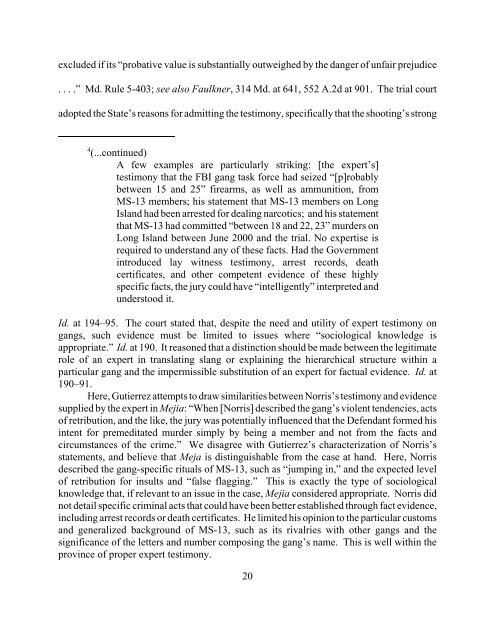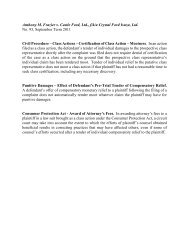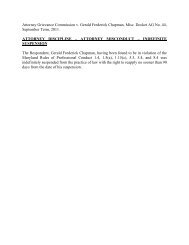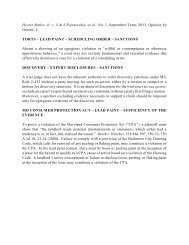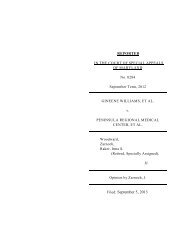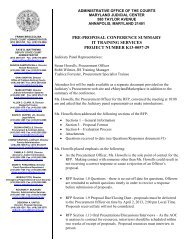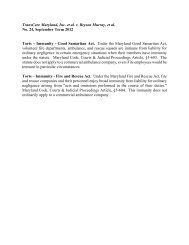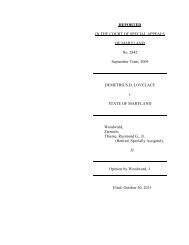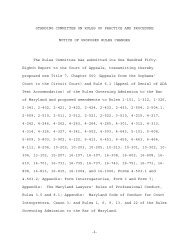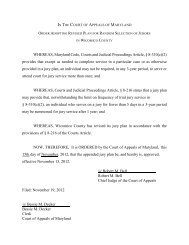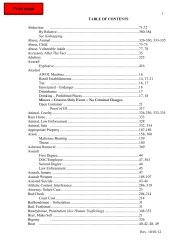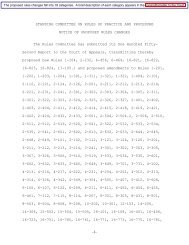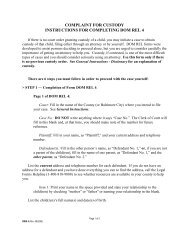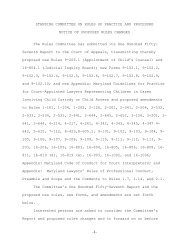HEADNOTE: Mario Rodriguez Gutierrez v. State of Maryland, No. 98 ...
HEADNOTE: Mario Rodriguez Gutierrez v. State of Maryland, No. 98 ...
HEADNOTE: Mario Rodriguez Gutierrez v. State of Maryland, No. 98 ...
Create successful ePaper yourself
Turn your PDF publications into a flip-book with our unique Google optimized e-Paper software.
excluded if its “probative value is substantially outweighed by the danger <strong>of</strong> unfair prejudice<br />
. . . .” Md. Rule 5-403; see also Faulkner, 314 Md. at 641, 552 A.2d at 901. The trial court<br />
adopted the <strong>State</strong>’s reasons for admitting the testimony, specifically that the shooting’s strong<br />
4 (...continued)<br />
A few examples are particularly striking: [the expert’s]<br />
testimony that the FBI gang task force had seized “[p]robably<br />
between 15 and 25” firearms, as well as ammunition, from<br />
MS-13 members; his statement that MS-13 members on Long<br />
Island had been arrested for dealing narcotics; and his statement<br />
that MS-13 had committed “between 18 and 22, 23” murders on<br />
Long Island between June 2000 and the trial. <strong>No</strong> expertise is<br />
required to understand any <strong>of</strong> these facts. Had the Government<br />
introduced lay witness testimony, arrest records, death<br />
certificates, and other competent evidence <strong>of</strong> these highly<br />
specific facts, the jury could have “intelligently” interpreted and<br />
understood it.<br />
Id. at 194–95. The court stated that, despite the need and utility <strong>of</strong> expert testimony on<br />
gangs, such evidence must be limited to issues where “sociological knowledge is<br />
appropriate.” Id. at 190. It reasoned that a distinction should be made between the legitimate<br />
role <strong>of</strong> an expert in translating slang or explaining the hierarchical structure within a<br />
particular gang and the impermissible substitution <strong>of</strong> an expert for factual evidence. Id. at<br />
190–91.<br />
Here, <strong>Gutierrez</strong> attempts to draw similarities between <strong>No</strong>rris’s testimony and evidence<br />
supplied by the expert in Mejia: “When [<strong>No</strong>rris] described the gang’s violent tendencies, acts<br />
<strong>of</strong> retribution, and the like, the jury was potentially influenced that the Defendant formed his<br />
intent for premeditated murder simply by being a member and not from the facts and<br />
circumstances <strong>of</strong> the crime.” We disagree with <strong>Gutierrez</strong>’s characterization <strong>of</strong> <strong>No</strong>rris’s<br />
statements, and believe that Meja is distinguishable from the case at hand. Here, <strong>No</strong>rris<br />
described the gang-specific rituals <strong>of</strong> MS-13, such as “jumping in,” and the expected level<br />
<strong>of</strong> retribution for insults and “false flagging.” This is exactly the type <strong>of</strong> sociological<br />
knowledge that, if relevant to an issue in the case, Mejia considered appropriate. <strong>No</strong>rris did<br />
not detail specific criminal acts that could have been better established through fact evidence,<br />
including arrest records or death certificates. He limited his opinion to the particular customs<br />
and generalized background <strong>of</strong> MS-13, such as its rivalries with other gangs and the<br />
significance <strong>of</strong> the letters and number composing the gang’s name. This is well within the<br />
province <strong>of</strong> proper expert testimony.<br />
20


